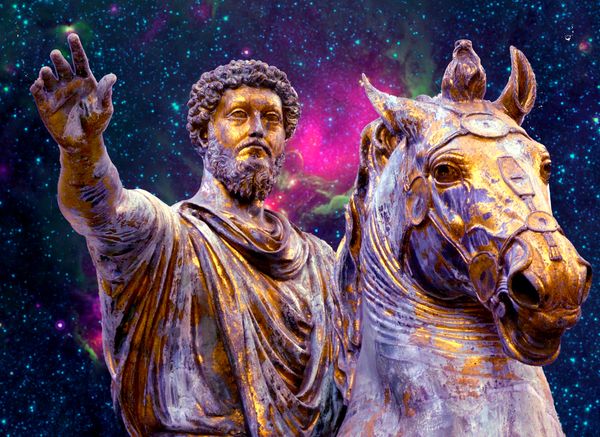James Clear • • 4 min read
Masters of Habit: Rituals, Lessons, and Quotes from Marcus Aurelius

Marcus Aurelius was Roman Emperor from 161 to 180. Known as the last of the “Five Good Emperors,” Aurelius was not born into power, but rather was adopted (his biological father died when he was three years old). Historians refer to him as a kind ruler who was incredibly loyal to his duty to serve the Roman Empire. [1]
As a boy, Aurelius was taught by various private tutors and he became particularly interested in philosophy. It is even said that he went so far as to take on the dress and behavior of a philosopher by sleeping on the floor at night. (Which, apparently, made his mother rather unhappy.)
We’ll never know for certain, but the story of his sleeping on the floor gives the impression that Aurelius had a natural curiosity and a desire to be a self-experimenter. If you told him, “Real philosophers sleep on the floor,” he wanted to try it out for himself.
This same thought process is evident in many of his later writings. Aurelius believed that philosophy wasn’t merely something to think about, but that it should also be practiced.
Today, Aurelius is perhaps best known for his collection of essays called Meditations. Although we don’t know many details about Marcus’ day-to-day life, Meditations offers a glimpse into his mind, his habits, and his approach to life. The very act of writing Meditations, which took him at least 10 years, is evidence to his commitment to habit, consistency, and improvement.
Many historians believe that Aurelius practiced writing as a daily habit, regardless of the circumstances. Some of his most famous passages were written from outposts and battlefields as he sought to expand the Roman Empire. It was through these essays that he shared his thoughts on how to balance the conflict of real life with the values of philosophy.
Below, you’ll find a range of quotes from Marcus Aurelius on philosophy, habits, and life.
Quotes from Marcus Aurelius
On fulfilling your duty…
Everything, a horse, a vine, is created for some duty. For what task, then, were you yourself created? A man’s true delight is to do the things he was made for.
On dealing with criticism…
You have power over your mind — not outside events. Realize this, and you will find strength.
Everything we hear is an opinion, not a fact. Everything we see is a perspective, not the truth.
You don’t have to turn this into something. It doesn’t have to upset you. Things can’t shape our decisions by themselves.
I have often wondered how it is that every man loves himself more than all the rest of men, but yet sets less value on his own opinion of himself than on the opinion of others.
On taking action…
It is not death that a man should fear, but he should fear never beginning to live.
Waste no more time arguing about what a good man should be. Be one.
On asking for help…
Don’t be ashamed to need help. Like a soldier storming a wall, you have a mission to accomplish. And if you’ve been wounded and you need a comrade to pull you up? So what?
On living a good life…
Your mind will be like its habitual thoughts; for the soul becomes dyed with the color of its thoughts. Soak it then in such trains of thoughts as, for example: Where life is possible at all, a right life is possible.
When you arise in the morning think of what a privilege it is to be alive, to think, to enjoy, to love…
Live a good life. If there are gods and they are just, then they will not care how devout you have been, but will welcome you based on the virtues you have lived by. If there are gods, but unjust, then you should not want to worship them. If there are no gods, then you will be gone, but will have lived a noble life that will live on in the memories of your loved ones.
Note: I’ve been told this final quote has been incorrectly attributed to Marcus Aurelius, but I left it in because I still find it useful.
Meditations by Marcus Aurelius
For more ideas, quotes, and musings from Marcus Aurelius, I highly recommend reading his book, Meditations. As far as we know, it was written mostly for his own self-improvement, so it doesn’t follow a rigid structure of any type. That said, the book is widely regarded as one of the greatest texts on Stoic philosophy and I think any reader would find something useful to take away from it.
Link: Meditations by Marcus Aurelius
Masters of Habit is a series of mini-biographies on the rituals, routines, and mindsets of great athletes, artists, and leaders.
Notes:
- I’m not a historian, but I have tried my best to deliver the facts correctly. (Which can be difficult when you’re talking about someone who lived thousands of years ago.) Much of the information in this article came from Aurelius’ own book, Meditations. Other sources include Stanford University’s Encyclopedia of Philosophy and the European Graduate School.
This article was originally published on JamesClear.com
James Clear writes at JamesClear.com, where he shares science-based ideas for living a better life and building habits that stick. To get strategies for boosting your mental and physical performance by 10x, join his free newsletter.


![Seneca’s Groundless Fears: 11 Stoic Principles for Overcoming Panic [Video]](/content/images/size/w600/wp-content/uploads/2020/04/seneca.png)







